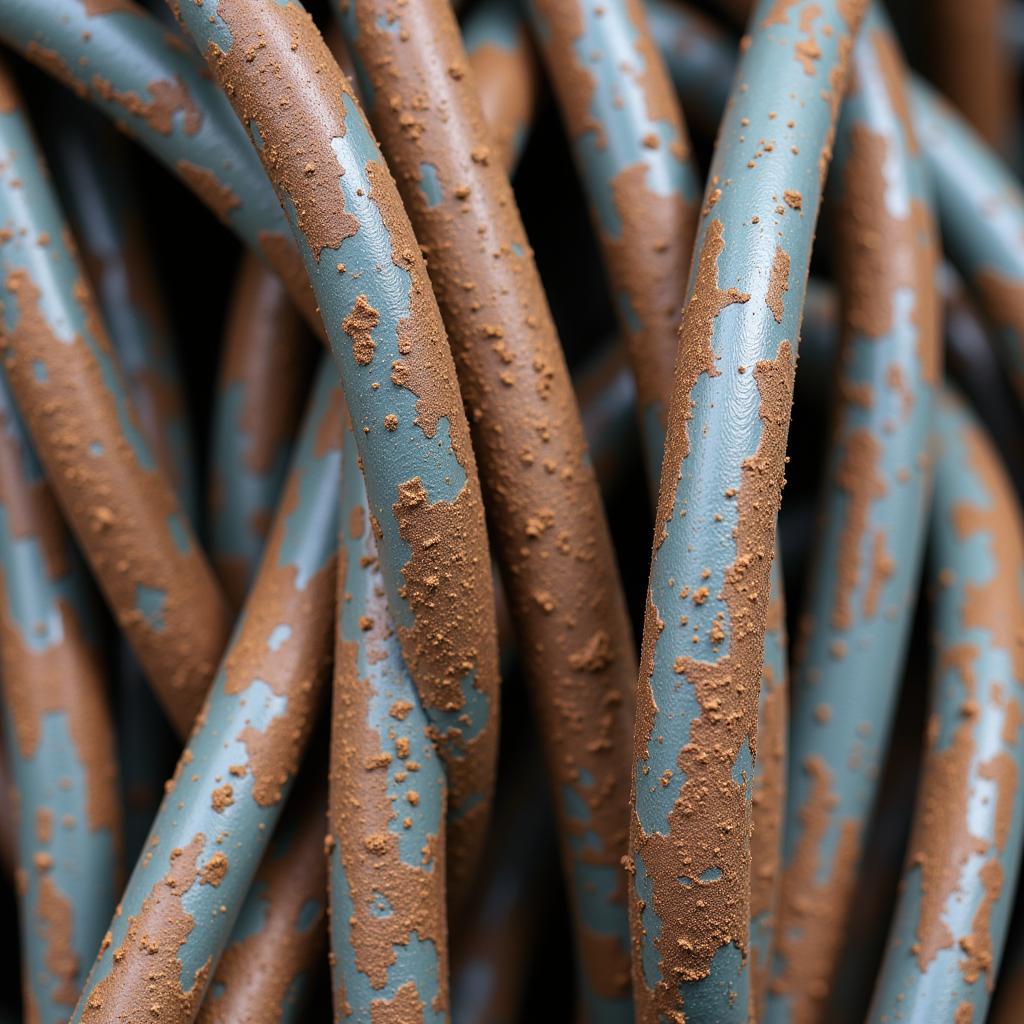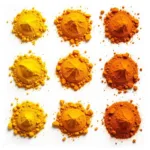Rust, that reddish-brown nemesis of metal, can significantly alter the appearance of wires, making them look aged and potentially compromised. How to change wire color rust isn’t about reversing the chemical process, but about mitigating its visual impact and preventing further deterioration. This involves cleaning, protecting, and sometimes even creatively disguising the effects of rust on your wires. Let’s explore the most effective methods to address this common issue.
Understanding Rust and Its Impact on Wire Color
Rust, or iron oxide, forms when iron or steel alloys react with oxygen and moisture. This chemical reaction creates the characteristic reddish-brown hue we associate with rust. On wires, rust not only changes the color but can also weaken the metal over time, potentially compromising its structural integrity and conductivity. Therefore, addressing rust is crucial not just for aesthetics, but also for safety and functionality.
a bicycle changes color as it rusts.
Why Does Rust Change Wire Color?
The change in color is a direct result of the chemical transformation of the metal. The iron in the wire reacts with oxygen, forming iron oxide, which has a distinct reddish-brown color. This is a visual indicator of the ongoing corrosion process.
How to Clean Rust from Wires
Cleaning rust from wires involves carefully removing the rust layer without damaging the underlying metal. Here are some effective methods:
- Wire Brush: Use a wire brush to gently scrub away loose rust. Choose a brush with bristles appropriate for the wire gauge to avoid scratching the metal.
- Sandpaper: Fine-grit sandpaper can be effective for removing stubborn rust. Use gentle, circular motions to avoid excessive abrasion.
- Chemical Rust Remover: Commercial rust removers can be used, but follow the manufacturer’s instructions carefully and ensure adequate ventilation.
- Vinegar Soak: Soaking rusted wires in vinegar can dissolve rust. After soaking, rinse thoroughly and dry completely.
Which Method is Best for Cleaning Rust?
The best method depends on the severity of the rust and the type of wire. For delicate wires, vinegar or a chemical remover may be preferable. For heavier-gauge wires with significant rust buildup, a wire brush or sandpaper might be more effective.
Protecting Wires from Future Rust
Prevention is key to maintaining the integrity and appearance of wires. Here’s how to protect them from future rust:
- Apply a Protective Coating: After cleaning, apply a rust-inhibiting primer and a protective topcoat. This will create a barrier against moisture and oxygen, preventing further rust formation.
- Keep Wires Dry: Store wires in a dry environment and avoid exposure to moisture whenever possible.
- Regular Inspection: Periodically inspect wires for signs of rust and address any issues promptly.
how to fix led lights that are different colors
Creative Solutions for Disguising Rust
Sometimes, complete rust removal isn’t feasible or desirable. In these cases, creative solutions can help disguise the rust and enhance the overall aesthetic.
- Painting: Paint can effectively cover rusted areas. Choose a rust-resistant paint formulated for metal surfaces.
- Decorative Wraps: Decorative wraps or tapes can be used to conceal rust and add a touch of style.
- Strategic Placement: If possible, reposition or rearrange wires to minimize the visibility of rusted areas.
“Regular inspection and prompt treatment are vital for managing rust on wires,” advises John Miller, a seasoned electrician with over 20 years of experience. “Preventing rust is always better than trying to cure it.” Another expert, Sarah Johnson, a materials scientist, adds, “Using high-quality, rust-resistant materials from the outset can significantly reduce the risk of rust formation.”
a bicycle changes color as it rusts
 Painted Rusted Wires
Painted Rusted Wires
Conclusion: How to Change Wire Color Rust
Changing wire color rust is achievable through a combination of cleaning, protection, and creative solutions. By understanding the causes of rust and implementing preventive measures, you can maintain the integrity and appearance of your wires for years to come. Remember, addressing rust is not just about aesthetics but also about ensuring the safety and functionality of your electrical systems.
FAQs
- Can I use WD-40 to remove rust from wires? Yes, WD-40 can help loosen rust, but it’s not a long-term solution. Follow up with cleaning and protective measures.
- Is rust on wires dangerous? Yes, rust can weaken wires and compromise their conductivity, potentially leading to electrical hazards.
- How often should I inspect my wires for rust? It’s recommended to inspect wires annually, especially in humid or corrosive environments.
- What type of paint is best for covering rusted wires? Use a rust-inhibiting primer and a rust-resistant paint formulated for metal surfaces.
- Can I use baking soda to remove rust? Baking soda can be mildly effective, but other methods are generally more efficient.
how to decorate christmas tree with colored lights
Need help with your rust-related wire issues? Contact us! Phone: 0373298888, Email: [email protected], or visit us at 86 Cau Giay, Hanoi. Our 24/7 customer service team is ready to assist you.
